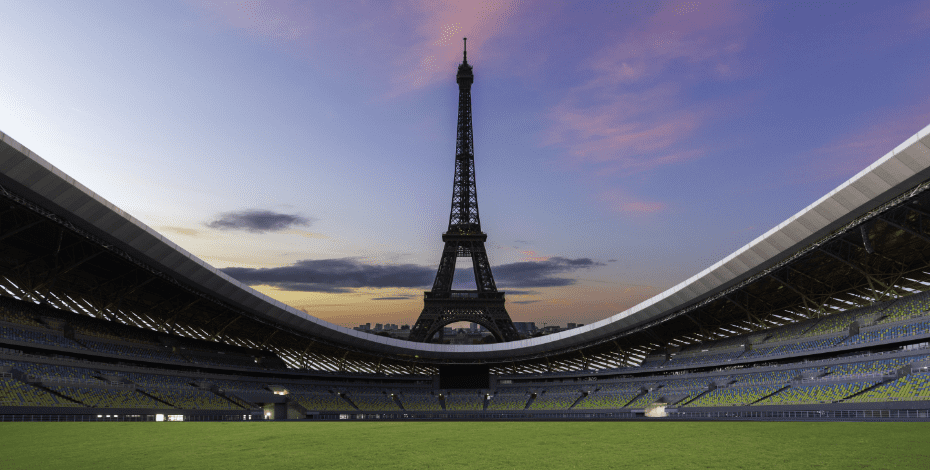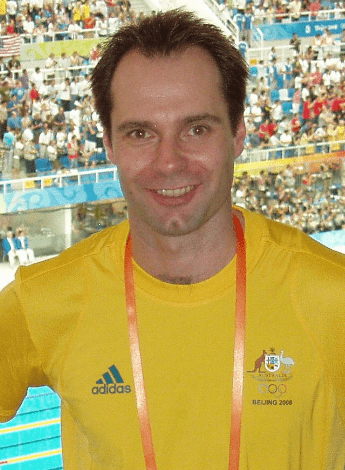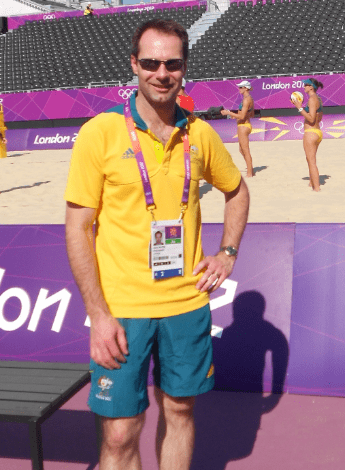
James makes a French connection

James Trotter will board a plane this month and fly to France to begin his role as physical therapies lead at the Australian Olympic team headquarters for the 2024 Summer Olympics. From the moment the plane lands on the tarmac in Paris, it will be all hands on deck.
As the Australian Olympic team geared up for the 2020 Olympics in Japan, physical therapies lead James Trotter MACP and the headquarters team were just a few weeks shy of shipping their equipment in a sea freight container to Tokyo when the world was hit by the COVID-19 pandemic.
In fact, plans were so advanced that James and the team had already ordered and packed most of the supplies they would need in Tokyo.
Through the uncertainty of the first few months of the pandemic, as the International Olympic Committee grappled with whether to postpone or cancel the Games, James and his team of physiotherapists in Australia watched and waited in limbo.
Briefings from the Chief Medical Officer via the Australian Olympic Committee offered a glimmer of hope.
Initially postponed, the Tokyo Olympic Games eventually went ahead in 2021 and became the first Olympic Games in history to be held without spectators.
James is hoping for a far less dramatic start to the XXXIII Olympic Games in Paris, which will run from 26 July to 11 August.
Paris will be the fifth Summer Olympic Games campaign as a physiotherapist for James, who has previously worked in Beijing (2008), London (2012), Rio (2016) and Tokyo (2020).
For the past two Summer Games, James has held the deputy lead and lead physiotherapist roles respectively, managing a team
of highly qualified professionals at the top of their game.
Appointments for the seven coveted positions in the Australian physiotherapy contingent were announced in March, following an intensive application and interviewing process, something that James, an APA Sports and Exercise Physiotherapist and an APA Musculoskeletal Physiotherapist, has been through many times.
Plans for the lead-up to Paris are already well advanced.

James Trotter.
James and a core leadership group will form an advance party and go to France to unpack the sea freight, set up the headquarters and get things organised.
The remainder of the team is then expected to follow, arriving a week before the start of the Games.
The other physiotherapists on the team are APA Sports and Exercise Physiotherapist and deputy physical therapies lead Dr Kate Watson MACP; APA Sports and Exercise Physiotherapist Dr Ebonie Rio MACP; Specialist Sports and Exercise Physiotherapist (as awarded by the Australian College of Physiotherapists in 2021), APA Sports and Exercise Physiotherapist and APA Musculoskeletal Physiotherapist Zoe Russell FACP; APA Sports and Exercise Physiotherapist Andrew Fooks MACP; APA Sports and Exercise Physiotherapist Daniel Sheehy MACP; and Steven Hawkins APAM.
In his role as the physical therapies lead in Paris, one of James’ main tasks is to manage the dialogue between all parties, from athletes to team managers, coaches and support crew. It is a dialogue that started months ago.
‘As part of the headquarters operations, we keep in contact with everyone in all the sports.
'In the five or six months preceding the Games we’re in contact with the team managers, the coaches and the athletes themselves,’ James says.
‘Let’s say a badminton athlete has been having knee problems—we’ll know that well before we get to Paris.
'We’ll have already been in touch with the appropriate people so that the athlete has a smooth transition of care between their therapist in their home environment and the physios we’ll have at the Olympic headquarters.’
James has set a few specific goals for himself.
In particular, he wants to provide athletes with a ‘safe space’ in the headquarters where they can come for treatment or just to chill out and relax so that the team can effectively manage the niggles and injuries the athletes present with, and the multidisciplinary medical team (including medical practitioners, nutritionists, psychologists and strength and conditioning staff) can work together to help bring out the very best in the Australian athletes.
‘If we can do that successfully, then I think we’ll find that the outcomes will take care of themselves.
'I would love it if all of the team members in our headquarters had such a great experience that they can look back at the Olympics and say “That was a busy, challenging yet amazing time that we had”.
'And if they can also make new professional acquaintances and new friends, then I think that would be a great outcome,’ James says.
In addition to his leading duties at the headquarters, James will work directly with the Australian beach volleyball team, having worked extensively with the men’s program back in his home town of Adelaide.
Each of the team physiotherapists will be assigned two to three sports to cover in Paris and James will serve as backfill in the event that anyone is ill or unavailable.
‘Most of the headquarters physiotherapists have been working nationally with two or three different programs over a reasonable period of time, so between us we know most sports,’ James says.
‘Every sport has its own language and its own unique challenges, particularly in terms of physical effects on the body.
'So gymnastics, for example, is completely different from archery, yet we will probably have to know a lot about both of those sports.’
During the intense pressure cooker of Olympic competition, one of the challenges James and the physiotherapy team will face is keeping calm even though an athlete and their coach may well be quite anxious about an injury presentation.
Another challenge will be mapping out a plan that an athlete can stick to in order to rehabilitate themselves after an injury and return to full training or competition.
Both take a great deal of professional knowledge and experience to navigate effectively, James says.
‘I know it sounds corny but I just go about doing the best job I can for the athletes and that includes working with the coaches,
the support staff, the nutrition staff and the physiology and massage staff.
'We do our best to prevent injuries and sore spots. And if somebody does get injured, which inevitably they will in this elite sporting environment, then we do our best to make sure that everybody’s on the same page and everybody has a plan,’ James says.
Sport has long been an obsession for James, who grew up playing tennis and AFL on the Mornington Peninsula in Victoria.
In his youth, James made some representative sporting teams at a district level and found himself in the hands of a physiotherapist for some niggling injuries when he was 16.
The experience opened up a career path for James and he pursued it with passion, studying at the University of South Australia and meeting his wife, who grew up in Adelaide and is also a physiotherapist.

James Trotter.
The young couple moved to regional Victoria, where James worked in a private practice and with the local football team as its physiotherapist. From there they moved to Hobart, Tasmania.
Once again, James worked in private practice, did some hydrotherapy and worked with local sporting teams. James credits those first years out of university with setting him up for the physiotherapy career he now enjoys.
‘Over 20 years in the profession, I’ve had a wonderful opportunity to work with athletes—from community sport right through to the elite level—and I love it,’ James says.
‘I enjoy the contest, the drama and the highs and lows that go with being involved with athletes and sporting teams.’
The father of three continues to work in private practice in Adelaide, at Leading Edge Physiotherapy, where he is a partner and senior physiotherapist.
In addition to maintaining a full client list at the practice, James devotes one day a week to the beach volleyball and swimming programs at the South Australian Sports Institute.
He is also the physiotherapist for the local SANFL team, the Woodville-West Torrens Eagles.
During periods of absence, such as the month he will be away in Paris for the Olympics, James’ clients are seen by other clinicians at the practice.
‘We are fortunate that we have a number of staff who can pick up a little extra over that period of time so the patient load will be distributed across our current staff,’ James says.
‘Then, for the sporting commitments that I have here, there are other physios who can step in and cover the game days while I’m away.
'And I’ll do a bit extra before I leave to try to make up my share of the work.’
Inside the Olympics physiotherapy HQ
At the Paris Olympics physiotherapy headquarters, James Trotter will lead a team of seven physiotherapists and seven massage therapists.
The headquarters are officially open from 7.30 am until about 9.30/10 pm.
However, depending on what events are on, there will be sessions by agreement outside of those times.
‘For example, in Tokyo we had some late events and I was actually doing recovery work with the athletes at 1.30 am.
'I know that our physio who was working with open water swimming athletes left the village at 3/3.30 am so they could get to where they were going by 4.30 am because that event kicks off very early in the morning,’ James says.
‘We treat the athletes the way we would in a private practice.
'We go to training sessions, both within the village and at the competition venues, and we go to competitions.
'So if anybody gets injured at taekwondo, for example, we’ll have someone right there ready to help them out, sitting next to the mat, ready to go.’
James says the work involves a lot of meetings with coaches and team staff to understand training regimes and all aspects of athlete care across the competition spectrum.
The environment is a collegial one, with communication key to ensuring that everything runs smoothly, even when things get a bit hectic during the heat of Olympic competition.
‘And then of course the village is abuzz—everybody’s excited to be there from every single country.
'Going to the food hall and mixing with athletes and therapists from other countries is exhilarating,’ James says.
‘The whole experience is thrilling and it’s a privilege and an honour to be involved.’
© Copyright 2025 by Australian Physiotherapy Association. All rights reserved.





